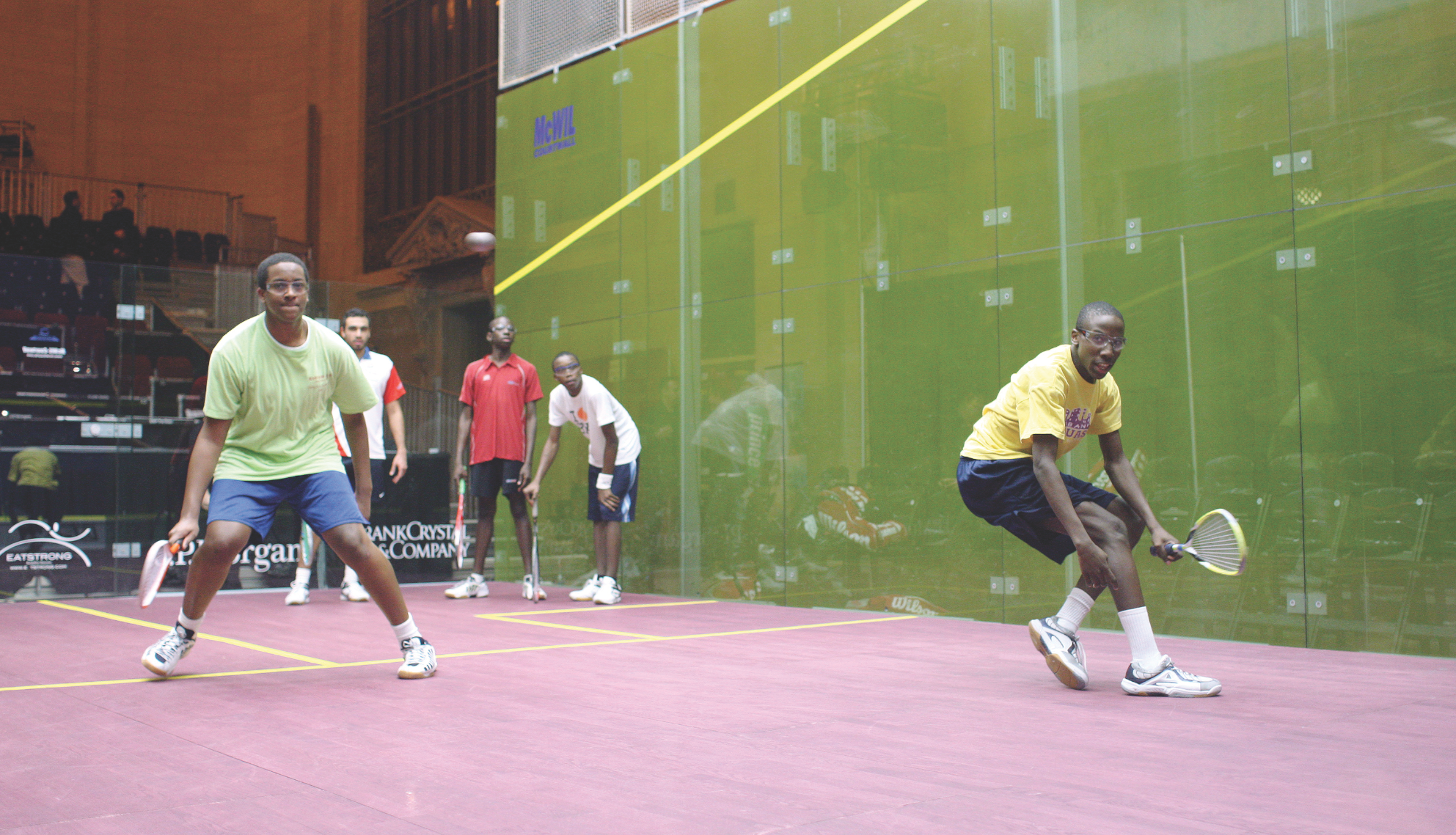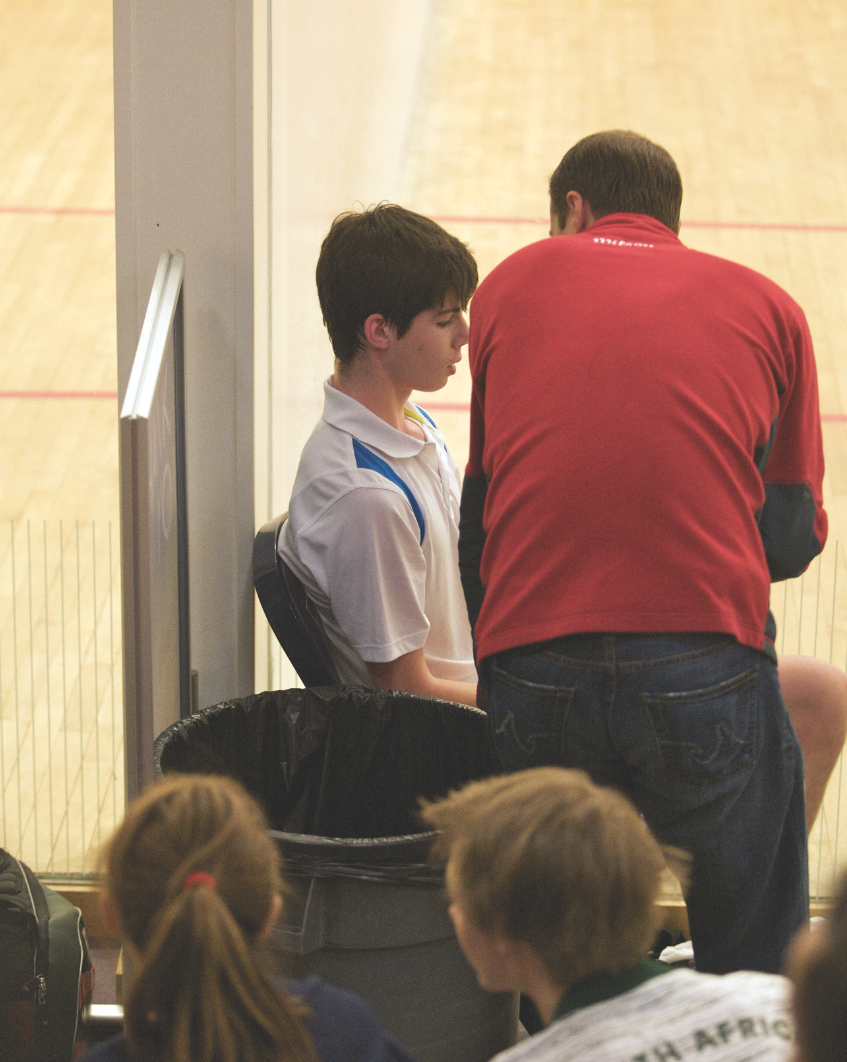
By Richard Millman, Director of Squash, Kiawah Island Club
“If you can meet with triumph and disaster
And treat those two imposters just the same”
From the poem “if” by Rudyard Kipling
The peak of enjoyment for a squash athlete is competition. The opportunity to test oneself against tough opposition, the joy of overcoming uncertainty, the reward for risk, the culmination of hard work, all of these are elements that define competition.
Of course with potential highs come potential lows. Success and failure. Triumph and Disaster as Kipling had it in his wonderful poem, If. And as Kipling asked, as he continued about these two “imposters,” can you treat them both the same?
This is an important question and it goes to the heart of the matter. Why compete?
There is a great deal of misunderstanding about why one should play competitions, and tournaments in particular. There is equally a great deal of misinterpretation of the concept of winning and losing.
Here’s my view point. There is no more powerful learning opportunity than the one to be found at “the coal face”—actually in the heat of battle. But not every battle is the final battle. Some are just practice skirmishes.
Frequently I hear parents and coaches say things like, “Jimmy isn’t ready to play a tournament yet;” or “We don’t want Sally to suffer the disappointment of being badly beaten.”
The problem is not the tournament or competition, but the understanding of what’s at stake. Is the student being taught that all competitions are a learning process and that the immediate result is less important than the journey and the lessons learned?
If we want to maximize our long term success and our potential for winning, there is no better developmental program than regular and planned competition from the earliest moment that technical skills allow for the competent conducting of a rally.
By that I mean that the player can serve and return.

Every individual is different emotionally of course. Some adults are not strong enough to handle losing. Some children can handle it at age four or five. These may be extremes. In general, children from seven up are ready to play tournaments. And the sooner the better. In my view one tournament is worth three private lessons—no matter who the coach.
So tournaments are a key part of the development process. Within that concept, however, you can load the importance of some tournaments in different ways.
You may play a first tournament to test the waters. Based on performance you can then do many things: Determine what needs to be practiced, decide when to play another tournament, decide on your program for the season.
After that first tournament you will have an abundance of decision making material at your disposal. As a coach you will have a better concept of what to do with the student or students in coaching. As a student you will have a heap of ammunition with which to attack your improvement—and loads of motivation. Practice will never be boring again—you have your reasons to work.
Coach and student can get together and think about a plan for the year, or more than a year.
Now you can decide your target tournament(s) and also which your warm-up tournaments will be. Also you can plan your training and your off season activity, such as camp, and when you can work on your game.
Ideally, I recommend that you group two or three consecutive training competitions together to develop your game. Take a week off before target tournaments if you can, but probably not more than a week—otherwise that strong mental picture you have developed in the previous two or three weeks will start to become a little fuzzy and you may suffer a crisis of confidence. Rest is a key ingredient—many a great player have destroyed a year’s work by failing to plan their rest.
Remember to keep forward-thinking. Even a target tournament should be seen in its relationship to your ongoing development and future target tournaments. A huge mistake is to see your plan only a year at a time. A good plan should go two, three years or more—always remembering to periodically take stock. Don’t get sidetracked because calendars are only printed for one year. Buy a five year calendar if that’s how your mind works.
Only think about finite events if you intend to retire from tournament play (unless you are suffering from ill health this should probably, but not necessarily, be somewhere around your 90th birthday). If you are a parent or a junior and you are thinking that you are not properly ready for a tournament—unless you can’t serve, you are missing the point by a mile. Play and see success not in terms of winning but in terms of improvement. Be assured, wins will come quicker that way.
Remember, squash is a performance-focused, not an outcome-focused activity. If you focus on the outcome you will forget to perform. Outcomes occur as a result of performance, so perform! And afterwards, review and plan for the next one.
So what to do at a tournament.
If you are a beginner, don’t make the mistake of thinking that the only important part of the tournament is when you are on the court in an official match. That is actually the smallest component of the event so far as you are concerned.
Here’s a list of things to do:
- Find out your first game time.
- Arrive early—if possible the day or the morning before.
- Check out the venue—where is the water fountain, the locker rooms, the restaurants, warm up space (if there’s only a hallway or a locker room, devise a warm up plan; maybe be ready to put your running shoes on and warm up outside. See if you can get a hit and get used to the court; see if there is someone around to drill with or play a couple of practice games.
- When the tournament starts, see how the courts are running. Allow at least 20 to 30 minutes for warm up—but don’t assume you will definitely start on time. Make sure you check in with the tournament director as soon as you arrive—don’t assume that anyone knows you’re there.
- When your match is up, make sure you have spare shirts, racquets, a drink or water nearby, a towel, and easily digestible food (protein and carbohydrate in a proportional mix).
- While hitting in the warm up notice if your opponent has any obvious technical deficiencies (e.g., no backhand, trouble volleying—or if they have movement problems). Don’t try to alienate your opponent by hitting the ball at them or to yourself multiple times and then crashing the ball back to them so it’s impossible to retrieve. No self respecting pro would hit the ball to themselves more than twice—so follow that example and share the warm up.
- Have a game-plan in place and stick to it. If you have a coach working with you between games, put all your focus into receiving advice, not transmitting it. Let the words wash over you and take what you can from it. You only have two minutes at the most, so don’t fight with your advisor no matter how much difficulty you’re in. Just take what advice you can and load it into the game plan.
- After the match try to spend a few moments going over the positives and negatives in your mind and make a mental note of what you want to write down later, so that you have good ammunition for your next training or coaching session, or your next match. Then check your next match time! That way you know how much time you have to play with—because you’ve still got a lot to do.
- Try and get food and drink on board within 20 minutes—even while you are stretching if you can. Which pre-supposes that you will have a cool down and stretch, If it was a particularly hard match, try and get on the exercise bike for a few minutes and drive those fatigue toxins out of your system. If you are really sore, an ice bath may help.
- Offer to referee whenever it is helpful and necessary—you will learn a great deal about the game and you will get to know your opponent if you referee with them. Refereeing is not a chore; it is an opportunity—both for knowledge and camaraderie—and it is a chance that selfish people miss out on, by avoiding it.
- If you have extra time or if you have been knocked out, use every available chance to get on court and play with anyone that happens to be hanging around the tournament. Don’t be shy! Jump on that court and introduce yourself. Play three-quarter court as much as you can. The tournament director may shoo you off the court, but don’t worry about that, just look for another court—even if it’s only for 5 or 10 minutes. This is one of the most undervalued and useful parts of a tournament. Opponents served to order—take advantage while you have the chance.
- Watch as much as you can. You can learn so much by watching other players. But don’t watch for the 30 minutes before your match. You can exhaust yourself mentally by playing someone else’s match in your head.
- While the tournament is on and particularly when it is over, get that notebook out and write a shopping list of items you want to add to or improve in your game. Consult your notebook before your next session or game to refresh your mind. Pass that information on to your coach.
There may be many other useful practices. Develop your own tournament routine and ritual. Work out what seems to work best for you.
Finally, remember, tournaments are a part of your improvement, not just the goal, but stepping stones along the way.
The road to success is paved with stepping stones of failure.
Embrace your opportunities to improve and have faith that if you work hard you will get the rewards you deserve.
Next month: Life-lessons from our favorite life-sport: What you can expect from Squash apart from fun and exercise.





